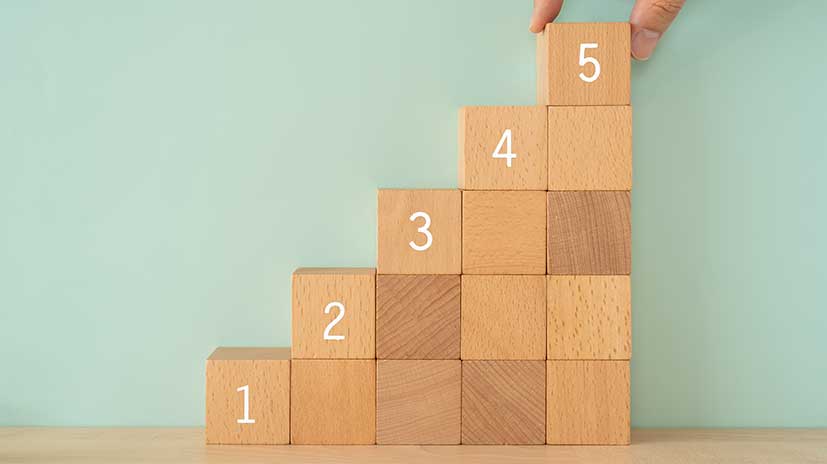What Are The 5 Stages Of Addiction Recovery?

Medically Reviewed By: Manish Mishra, MBBS

Written by: Dr Jason Martin Psy.D., LCPC
Addiction is a complicated and difficult disorder, and getting to the point of accepting help and treatment can be a long road. While the road may be long, moving through the stages of recovery is necessary to starting and continuing a healthy, alcohol- or drug-free life.

Substance use disorder and addictive substances affect countless people every year. Overcoming addiction is difficult and complex, and recovery must be customized to each individual person in order to meet their specific needs.
Although the substance abuse recovery process must be unique to each person, there are five stages of change that most people with addiction go through, including precontemplation, contemplation, preparation, action, and maintenance.
1. Precontemplation
The precontemplation stage is the first stage of recovery. A person may not even realize they have an addiction or that it’s problematic. They may be in denial and are unable to understand the consequences of their actions for themselves and others.
They likely only see the negatives of quitting their addictive behaviors, not the positives it could bring to their life. They aren’t ready to seek help, and they likely don’t recognize that they need it.
At this stage, the person with addiction may have an inkling that there’s a problem, but they aren’t ready to fully accept it.
They will likely continue to rationalize their drug and/or alcohol abuse. If a family member plans an intervention, they will likely not listen to what their loved one has to say.
2. Contemplation
The contemplation stage refers to when the person with addiction might start thinking about changing their addictive behaviors and drug use.
They may weigh the pros and cons. This is ultimately the “getting ready” stage of addiction recovery, and it’s usually six months before someone actually begins their recovery process.
As the person contemplates their addiction and learns more about their habit and how it affects them and their loved ones, the more their mind opens to a drug or alcohol addiction treatment program.
Unfortunately, many people need to hit rock bottom before they decide to get help. At this stage, that rock bottom has yet to occur.
3. Preparation
The preparation stage, or determination stage, is when someone with addiction becomes ready to take action. It could start with looking for information online or making changes to quit at home and self-manage withdrawal symptoms.
If withdrawal symptoms occur and lead to further drug or alcohol use, professional healthcare is likely the next step. They may first look for drug addiction treatment centers near them or consider attending support group meetings.
4. Action
The action stage is when the person with addiction recognizes they have a problem, takes action, and seeks out a rehab program.
They may decide to go to an inpatient treatment center, an outpatient treatment facility, or a detox center. They may also seek out support groups and group therapy, or schedule an appointment for individual behavioral therapy sessions to develop coping mechanisms.
The action stage of early recovery might also involve addressing their mental health with dual diagnosis treatment, a holistic approach designed to treat both addiction and co-occurring mental health issues at the same time.
Not all actions during this stage, however, are completely successful. They may experience their first relapse during this stage.
Relapse, in fact, is part of the recovery journey. It can often help people with addiction better understand the challenges of recovery and sobriety.
5. Maintenance
If someone has been in recovery for six months or more, they enter the maintenance stage. They have learned relapse prevention strategies and ways to cope with triggers and cravings. They are using those tools and strategies to deal with difficult situations and maintain their sobriety.
This is the stage where those with substance use disorder should look back on all the changes they’ve made and all they have achieved.
They will also likely realize that the decision to quit drugs and/or alcohol was the right one. But this isn’t the end. They will continue to go to support group meetings, family therapy, and individual or group counseling sessions.
This is the stage they stay in for life, and the one that they may need to return to again and again if they relapse.
Life Skills
Sometimes, learning valuable life skills can help with the maintenance stage. The life skills you may think of learning include:
- how to balance your budget
- how to keep a healthy lifestyle
- how to build a safe and supportive environment
- how to maintain a healthy and strong support system
- how to be effective with time management
If you or a loved one are struggling with drug abuse or addiction and are ready to take action, Ohio Recovery Center is here to help you on your recovery journey.
We offer a wide range of substance abuse treatment programs, including detox, inpatient drug rehab, medication-assisted treatment, and aftercare.
To learn more about our treatment options, please call our helpline today.
- Loma Linda University School of Medicine — Stages of Change Model https://medicine.llu.edu/academics/resources/stages-change-model
- SMART Recovery — The Stages of Change https://www.smartrecovery.org/smart-articles-draft/the-stages-of-change/
- Substance Abuse and Mental Health Services Administration (SAMHSA) — 5 Stages of Treatment https://www.ncbi.nlm.nih.gov/books/NBK64208/

